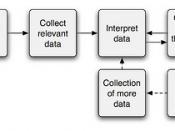Quantitative data is data in a numerical form- in the form of numbers. Qualitative data spans a range of material from the descriptions of social life provided by participant observation and unstructured interviews to information from written sources.
Quantitative data is usually in the form of statistics. Questionnaires and structured interviews are typical methods used when gaining quantitative data, as the results are easily transferable to a numerical form. Qualitative data is associated with participant observation, it can include unstructured interviews, information from written sources such as diaries, autobiographies and novels, information focusing on descriptive aspects of social life, thus helping the researcher experience that portion of social life.
Quantitative data is usually objective, quantitative data is numerically and statistically based. Examples of objective data are divorce statistics, crime statistics and opinion polls; the bias of the researcher is irrelevant as long as he/she doesn't deliberately alter the findings. Exceptions apply when referring to 'interviewer bias'.
'Interviewer bias' is unavoidable; the interviewer will undoubtedly affect the responses of the interviewee. The interviewer has particular personality traits, e.g. aggressive/passive; they also have particularly social characteristics, e.g. race, gender, age group and social class. The social and psychological characteristics will be received and recognised in certain ways by the interviewee, and undoubtedly have an effect on their responses. Qualitative data is not objective; the researcher has to adopt the values of the subjects, which will affect the data collected. One of the most popular methods is participant observation, also connected is when a researcher 'goes native'. By temporarily becoming or by pretending to become members of the group being studied it is easier to provide an accurate description of social life for that particular subject, unfortunately this includes adopting the values of the subject too, making the research void of objectivity.
Quantitative research methods are more reliable than qualitative research methods, because quantitative data usually consists of official statistics, gathered and averaged among many mathematicians where as qualitative research relies heavily upon the validity of the researcher, as essentially it is the researchers experiences which influence his/her results.
Various other advantages to quantitative research methods include; Easy to interpret, the results are written in numerical or statistical forms, thus interpretation isn't difficult. This approach is favoured by positivists, because of its scientifically natured methods. With Quantitative data there is no possibility of 'going native', as the researcher doesn't 'get involved' with the 'subject'. The actual methods are quicker / less time consuming, and more cost effective, these apply to mass research as in postal questionnaires. Quantitative methods can cover the wider population (postal questionnaires), thus meaning the research can be classed as Representative - sampling, the researcher can generalise results to the wider population. And the data received can be used to establish relationships/correlation's between variables (not cause effect relationships).
The disadvantages to quantitative data are; the research fails to give an in-depth picture compared to qualitative data, which is rich with description. Qualitative data can be unreliable (see Durkheim's study of suicide). The research methods can induce the researcher to manipulate the 'subjects' answers to suit the research. Quantitative data overlooks motivations, feelings, opinions, and attitudes of individuals who are carrying out the research and also those individuals participating in the research. Sampling problems can also occur making the research not always representative and generalisation is impossible if results aren't representative. Low response rate, particularly with postal questionnaires, often occurs too. This type of research does not produce cause/effect relationships. The research is usually not valid because the researcher relies on the truthfulness of the 'subject'.
From the above conclusions could be drawn as to which type of research methods or more capable of the job in hand, but depending on the need for the research then each research methods purpose can increase/decrease. E.g. - to get a picture of social life - qualitative data, to get data about social life - quantitative. From my findings I have found that there are more advantages than disadvantages, although this doesn't make it 'better' against qualitative, it is merely 'better' at the specific task it performs.


